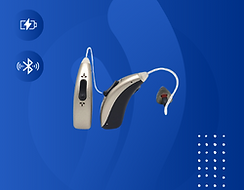When should I purchase a Hearing Aid?
- May 23, 2023
- 3 min read
Updated: Jun 15, 2023
Hearing loss is a common condition that can significantly impact an individual's quality of life. However, not all cases of hearing loss require the use of hearing aids. Determining the appropriate level of hearing loss for considering hearing aids involves understanding various factors, including the severity of the loss, the impact on daily activities, and the individual's personal preferences. In this blog, we will delve into the topic of what level of hearing loss typically warrants the use of hearing aids. It is important to note that this information is for general guidance and consulting with a qualified audiologist is essential for accurate diagnosis and personalized recommendations.

Understanding Degrees of Hearing Loss
Hearing loss is categorized into different degrees based on the severity of the impairment. The four common degrees of hearing loss are as follows:
Mild Hearing Loss: Individuals with mild hearing loss may have difficulty understanding soft or distant speech. Conversations in noisy environments may also pose challenges. However, they can usually hear and understand speech adequately in quiet settings.
Moderate Hearing Loss: Moderate hearing loss makes it challenging to understand conversations without the assistance of hearing aids. Even in quiet environments, speech may sound muffled or unclear. Background noise further exacerbates the difficulty.
Severe Hearing Loss: Severe hearing loss significantly impacts the ability to understand speech, even in favorable listening conditions. Louder sounds, such as alarms or doorbells, may still be audible, but day-to-day communication becomes highly challenging.
Profound Hearing Loss: Profound hearing loss indicates an almost complete or total inability to hear sounds without amplification. Even extremely loud sounds may not be audible or intelligible.
Factors Influencing the Need for Hearing Aids
While the degrees of hearing loss provide a general framework, the decision to use hearing aids should consider additional factors:
Speech Understanding: If hearing loss affects speech understanding, especially in everyday situations and social interactions, it is a strong indicator for considering hearing aids.
Impact on Daily Activities: Assess the impact of hearing loss on daily activities. Difficulty hearing the TV, participating in conversations, or enjoying social gatherings can significantly impact overall quality of life. When hearing loss interferes with normal activities, hearing aids become increasingly important.
Communication Challenges: Consider the challenges faced when communicating with loved ones, friends, and colleagues. Struggling to understand conversations or constantly asking people to repeat themselves can lead to frustration and social isolation.
Tinnitus: Tinnitus, or ringing in the ears, often accompanies hearing loss. If tinnitus interferes with concentration or exacerbates the difficulty in understanding speech, hearing aids with tinnitus management features may be beneficial.
Individual Preferences: Personal preferences and goals play a crucial role in determining the need for hearing aids. Some individuals may prioritize maintaining an active social life, engaging in hobbies, or continuing professional responsibilities. Hearing aids can significantly enhance these aspects, leading to a more fulfilling lifestyle.

Consultation with an Audiologist
While this blog provides general information, it is important to consult with a qualified audiologist to determine the appropriate level of hearing loss requiring hearing aids. An audiologist will conduct a comprehensive hearing evaluation, taking into account the individual's unique circumstances, medical history, and lifestyle. The audiologist will provide personalized recommendations tailored to address specific hearing needs.
In summary, determining the level of hearing loss that necessitates hearing aids involves considering the severity of the impairment, the impact on daily activities, and individual preferences. Mild to profound hearing loss can benefit from hearing aids if it affects speech understanding, interferes with daily communication, and impairs overall quality of life. Remember to consult with an audiologist or primary physician for a comprehensive evaluation and personalized recommendations. By seeking professional guidance, individuals can regain their hearing and live an easier life!





.png)
.png)
.png)
Comments